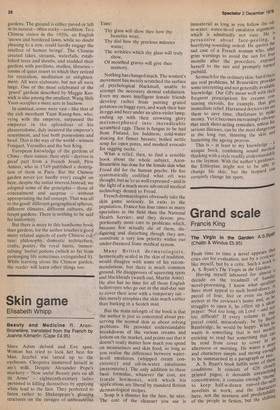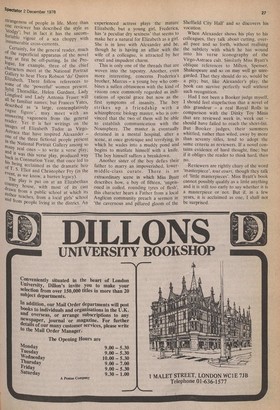Grand scale
Francis King
The Virgin in the Garden A.S.13Yatt (Chatto & Windus £5.95) From time to time a novel appears that cries out for evaluation, not by a reviesve 1,5 r like myself, but by a critic. Such a vvork A. S. Byatt's The Virgin in the Garden. Having myself laboured for decade on the treadmill of Suncr. novel-processing, I know what qualitie: have most appeal to such bond-slaves. r' parcel of four, five or even six /boa: arrives at the reviewer's home and, as lit struggles to open it, he offers up a silent prayer: 'Not too long, oh Lord and 11°( too difficult!' If every volume in parcel could, miraculously, be by 13e'he Bainbridge, he would be happy. What,"iy wants is something that is not enticing to read but something that ea-, be read from cover to cover afternoon or morning. He wants a stl and characters simple and strong en°lig to be summarised in a paragraph or Wise' A. S. Byatt's book fulfils none of conditions. It consists of 428 close'Y cporirilteendtraptaiognes;it ict ondteaminas111171 e`nitbietittlintell to keep half-a-dozen run-of-the-111`r'.., novelists at work; and the characte have, not the neatness and pred1ctabibt):. of the people in fiction, but the shifti" strangeness of people in life. More than one reviewer has described the style as 'Stodgy% but in fact it has the uncomfortable vigour of a sea choppy with innumerable cross-currents.
Certainly, for the general reader, much of the superficial apparatus of the novel May at first be off-putting. In the Prologue, for example, three of the chief characters meet at the National Portrait Gallery to hear Flora Robson `do' Queen Elizabeth. There follow references to sorne of the 'powerful' women present. Sybil Thorndike, Helen Gardner, Lady Longford and Lady Antonia Fraser will all be familiar names; but Frances Yates, described as 'a large, contemplatively vague figure', may meet with an answering vagueness from the general reader. Yet it is her writings on the Images of Elizabeth Tudor as VirgoAstraea that have inspired Alexander — ?ne of the three fictional people present In the National Portrait Gallery among so many real ones — to write a verse plaY; and was this verse play, produced way back in Coronation Year, that once led to his being acclaimed as the dramatic heir of T. S. Eliot and Christopher Fry (in the event, as we know, a barren legacy). The play is put on at an Elizabethan country house, with most of its cast drawn from a public school at which its author teaches, from a local girls' school and from people living in the district. An experienced actress plays the mature Elizabeth; but a young girl, Frederica, has 'a peculiar dry sexiness' that seems to make her a natural for Elizabeth as a girl. She is in love with Alexander and he, though he is having an affair with the wife of a colleague, is attracted by her cruel and impudent charm. This is only one of the threads that are woven into the tapestry. Another, even more interesting, concerns Frederica's brother, Marcus — a young boy who combines a sullen obtuseness with the kind of visions once commonly regarded as indications of special grace but now as the first symptoms of insanity. The boy strikes up a friendship with a schizophrenic biology master, who is convinced that the two of them will be able to establish communication with the Noussphere. The master is eventually detained in a mental hospital, after a scene, at once grotesque and terrifying, in which he wades into a muddy pond and begins to mutilate himself with a knife. The boy himself suffers a breakdown. Another sister of the boy defies their father to marry an impoverished, lowermiddle-class curate. There is an extraordinary scene in which Miss Byatt describes how, a boy of fifteen, 'imprisoned in coiled, rounding tyres of flesh', this character hears a Father from a local Anglican community preach a sermon in 'the cavernous and pillared gloom of the Sheffield City Hall' and so discovers his vocation.
When Alexander shows his play to his colleagues, they talk about cutting, overall pace and so forth, without realising the subtlety with which he has wound into his verse iconography of the Virgo-Astraea cult. Similarly Miss Byatt's oblique references to Milton, Spenser, Shakespeare and so on may well go unregarded. That they should do so, would be a pity; but, like Alexander's play, the book can survive perfectly well without such recognition.
Had I not been a Booker judge myself, I should feel stupefaction that a novel of this grandeur — a real Royal Rolls in comparison with the Dinky Toy Minis that are reviewed week in, week out — should have failed to reach the short-list. But Booker judges, their summers whittled, rather than wiled, away by more than seventy titles, tend to adopt the same criteria as reviewers. If a novel contains evidence of hard thought, fine; but if it obliges the reader to think hard, then no.
Reviewers are rightly chary of the word 'masterpiece', tout court, though they talk of 'little masterpieces'. Miss Byatt's book cannot possibly qualify as a little anything and it is still too early to say whether it is a masterpiece or not. But if, in a few years, it is acclaimed as one, I shall not be surprised.







































 Previous page
Previous page